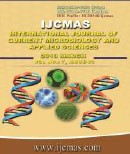


 National Academy of Agricultural Sciences (NAAS)
National Academy of Agricultural Sciences (NAAS)

|
PRINT ISSN : 2319-7692
Online ISSN : 2319-7706 Issues : 12 per year Publisher : Excellent Publishers Email : editorijcmas@gmail.com / submit@ijcmas.com Editor-in-chief: Dr.M.Prakash Index Copernicus ICV 2018: 95.39 NAAS RATING 2020: 5.38 |
The present investigation was focused primarily to develop synbiotic herbal yoghurt incorporating Ocimum sanctum essential oil (EO). Prebiotic was selected on the basis of specific growth rate (µ) of cultures. EO concentration was optimized on the basis of its compatibility of culture and sensory properties. Investigations on effect of prebiotics (inulin and maltodextrin) on growth kinetics of probiotic cultures indicate that former enhanced change in log count/ml and specific growth rate (µ) faster than maltodextrin at 3% level. Change in log count and specific growth rate were observed to the tune of 1.78 CFU/ml and 0.683 h-1 at 3% inulin in comparison to 1.42 CFU/ml and 0.545 h-1 of maltodextrin at above level during incubation period in case of L. bulgaricus LB-2. Almost similar trend was obtained in case of S. thermophilus ST-1 for both prebiotics. Culture inoculum at rate of 1%and EO at concentration 0.5 µL/ml was found compatible with yoghurt culture on the basis of sensory, physiological and microbiological quality. The developed product was assessed for shelf life quality parameters upto 21 days. The developed product was judged suitable for consumption with acceptable sensory attributes and viable probiotic counts (108-109 cfu/ml) till 15 days of storage. The developed product possesses antioxidative activity and phenol content of 763.8µM trolox equivalent/L and 7 mg GAE/100 ml respectively. Further research is needed by employing clinical trials to substantiate in vitro data. As a value added synbiotic herbal product, it may have great potential for commercialization.
 |
 |
 |
 |
 |